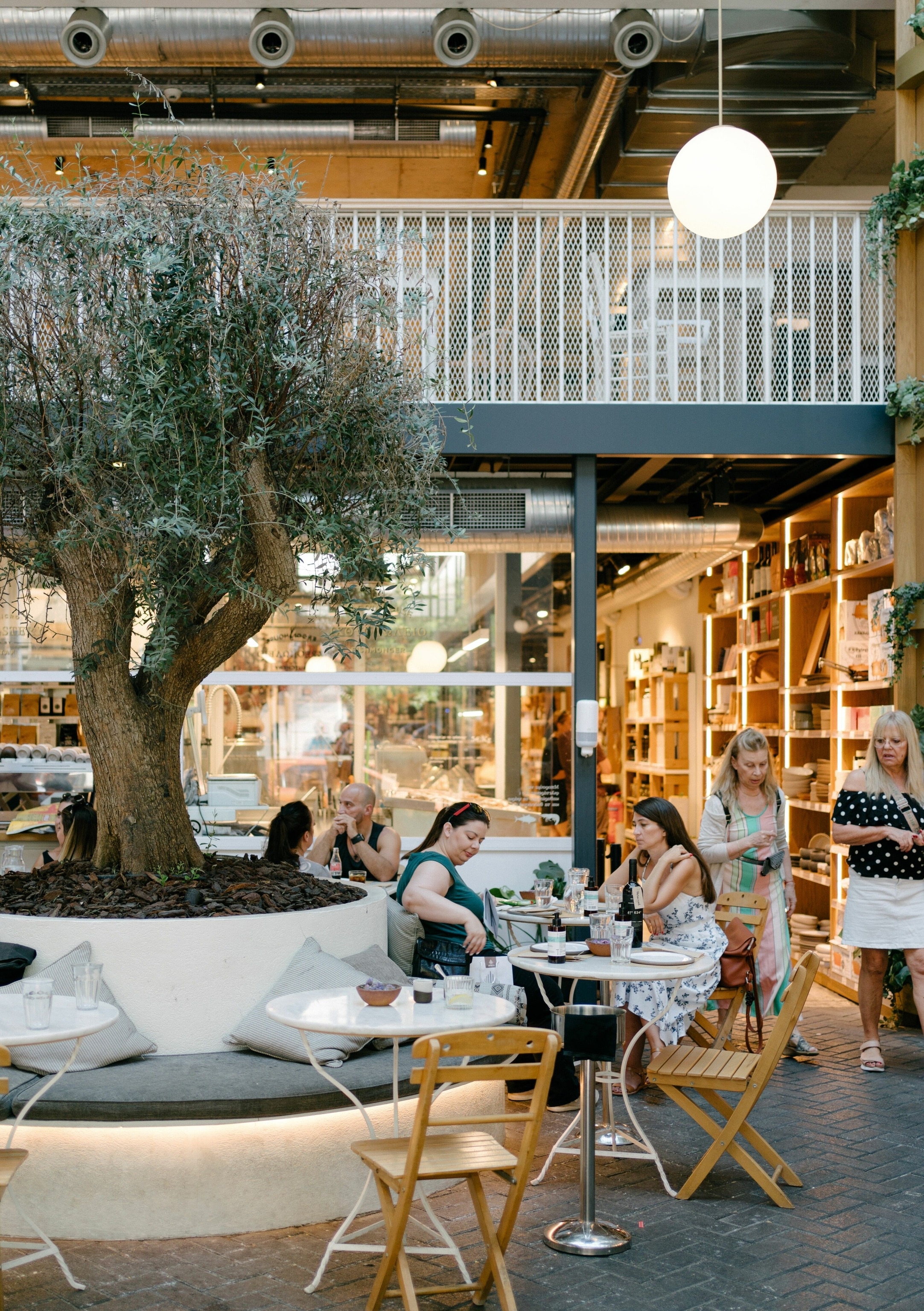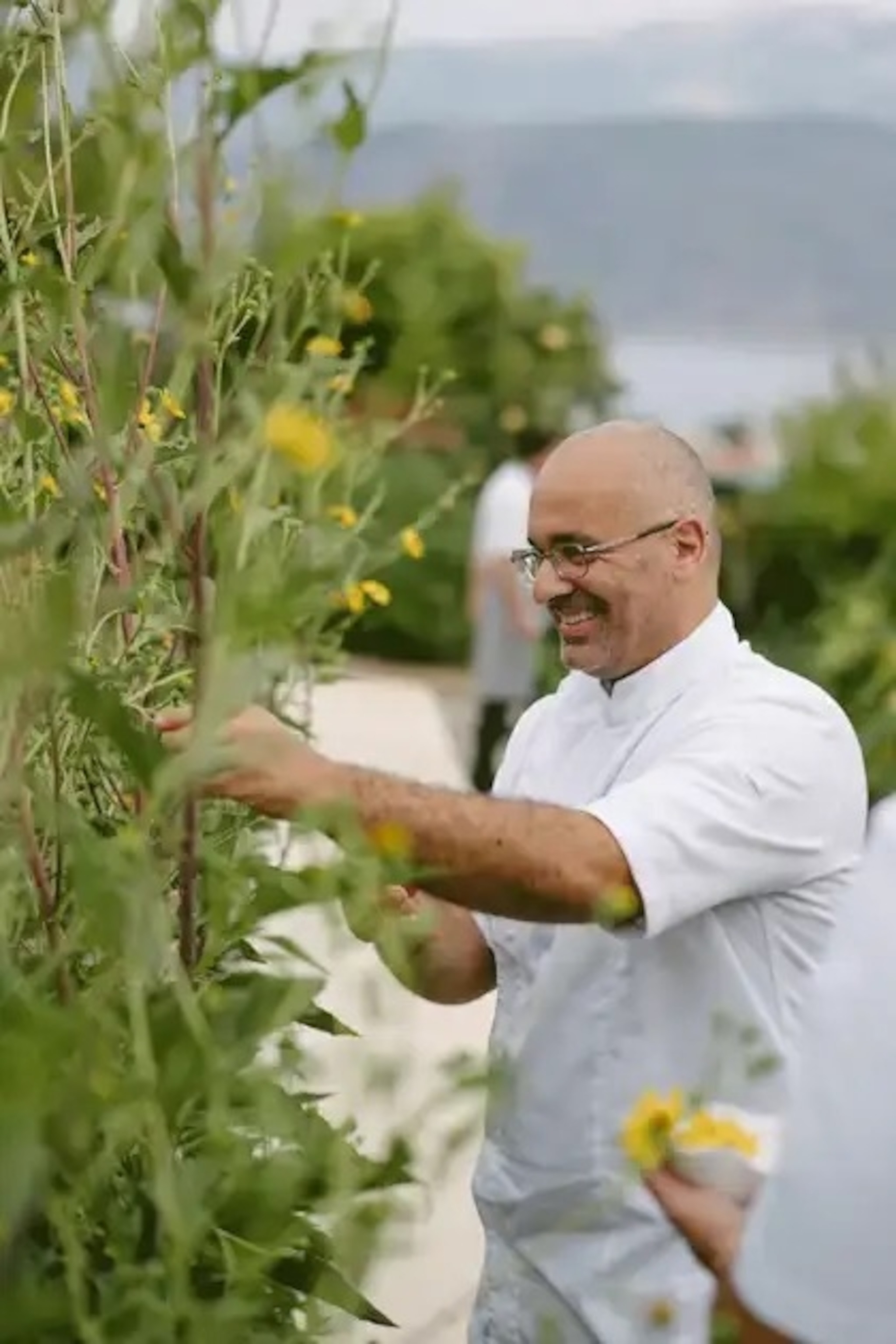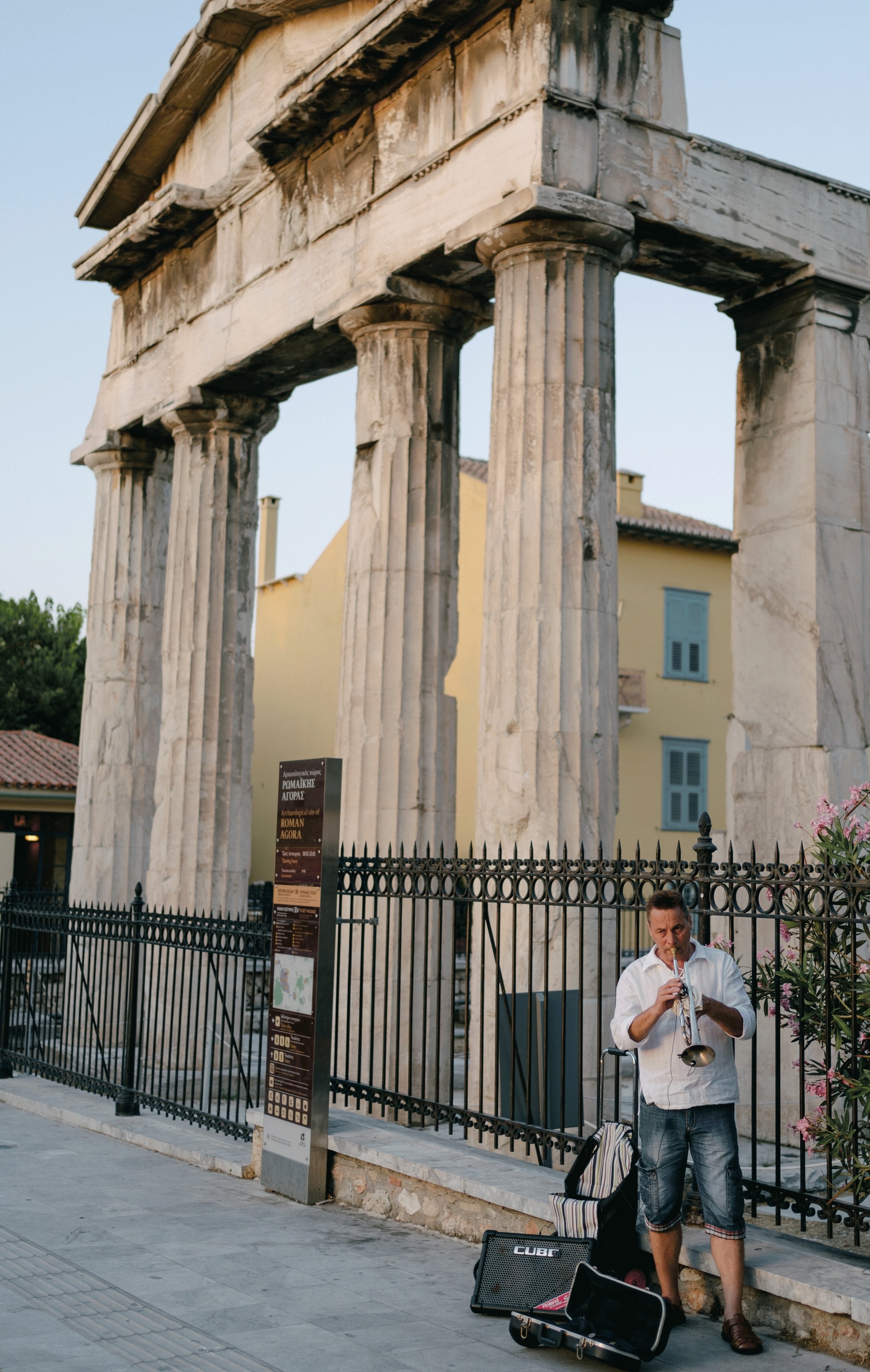
Exploring the new culinary movement sweeping Athens, from grape-less wine to Japanese influences
For a taste of Greece, there’s nowhere like the capital. Athens’ food scene is being transformed with age-old producers running cutting-edge restaurants and hip bakeries adding fresh flavours to historic neighbourhoods.
Tasos Mantis greets me in his family’s organic garden, where plots of Jerusalem artichokes, sweet-smelling basil and brick-red bergamot slope some 2,500ft down towards the Corinthian Sea. This is the summer home of his parents: 72-year-old father, Babis, a former plumber, and mother, Maria, a welcoming Greek matriarch, whose tanned face breaks into a soft smile as I arrive.
We’re around an hour’s drive from Athens, in Alepochori village, but the scene feels a world away. Swallows swoop overhead. Chickens wallow in the dust. Gravel crunches underfoot as we browse raised beds, but overall the prevailing sound is of silence.
Tasos, scruffy in his earth-stained Airtex trainers, stands with secateurs ready to clip off a selection of the garden’s 32 varieties of edible herbs and flowers for me to taste. His understated look belies his glamorous reputation — the chef is one of Greece’s best, with a constellation of Michelin stars under his belt from stints at Belgium’s gilded Hof Van Cleve, Heston Blumenthal’s Fat Duck and Hytra restaurant in Athens.
I’m here to find out about the produce behind Soil, Tasos’s debut restaurant which he opened in a century-old house in November 2021 with co-owner Alex Mouridis, in the up-and-coming Pangrati neighbourhood in central Athens. Soil stands at the forefront of the city’s evolving food scene, as an exciting, self-styled proponent of ‘earthy gastronomy’. Like many of the new dining spots in Athens, its foundations are rooted in time-honoured agrarian traditions. Menus borrow from ancient Greek recipes handed down over generations, reimagined afresh for a new wave of well-dressed Athenian diners.
Seeking an elder’s wisdom, Tasos derailed his father’s retirement plans, drafting the keen amateur gardener to supply produce for Soil. “My father is from the island of Lesbos. After he retired, he came to Alepochori to rest. But now…” Tasos smiles, casting his eyes across a garden bristling with lavender-like anise hyssop, edible marigolds and honey-scented sweet alison; all nurtured by the father to share with the son. “He doesn’t admit it, but he loves it,” says Tasos of his father’s new role. “Even if he tells me he’s going fishing, so he can be alone — and escape me,” he laughs.


We tour the garden, trying heirloom and heritage herbs, many of which have fallen out of favour in modern Greek cooking, but are now being given new life under this father-and-son partnership. We move on past young, sour-tasting grapes, coiled around a vine. “We’ll make juice from this,” gestures Tasos, cutting some for me to try.
As the sun bathes the Greek countryside in a soft, lemony light, we ride into the city to Soil, where all this prime produce is put to good use. Tasos, freshly spruced in chef whites, leads me through to the restaurant’s courtyard garden, a leafy spot that recalls the tranquillity of the Alepochori house. A cat lazes on a wall. Trees rustle in the breeze. We sample food that’s garden-fresh, traditional yet contemporary: mini eel burgers flavoured with lemongrass and sorrel, shrimp with fennel and scallop, and a lemon confit.
It’s not only fine-dining spots like Soil that are reaching back in time to break new ground. Grocers, fishermen and bakers are doing so, too. One such example is Thomas and George Douzis, two brothers now in their thirties whose grandfather worked a greengrocer in the northern city of Thessaloniki. The siblings tapped into their family history to create Ergon House — a boutique hotel in Athens with a focus on food that extends far beyond an on-site restaurant. The ground floor is given over to bakers, butchers and producers from all over Greece, recalling the country’s ancient agora (marketplace) tradition. Its design is cool-contemporary, incorporating an ancient olive tree, a ‘vertical orchard’ and a full-wall graffiti mural by Greek artist INO, soaring up to an 80ft-high atrium. There are spaces to dine and drink, private chefs to hire and cooking classes to sign up to, while guest room mini-bars contain goodies that represent the market in microcosm. Crowning it all is a rooftop cocktail spot with drinks served by pioneering Athens bar The Clumsies, whose original downtown address ranked fourth in the 2021 list of The World’s 50 Best Bars.
Across town, in the Kato Petralona district, the co-owners of The Clumsies are busy with another new project. Sporting tattoos and a generous moustache, Vasilis Kyritsis greets me outside his new hole-in-the-wall bar, Line. In the entrance is a sturdy marble table, sculpted from a 1920s Athens fountain. To the right, cornflower-blue couches that wouldn’t be out of place in a boutique hotel. Having taken on the cocktail scene serving outré craft drinks at The Clumsies in 2014, Vasilis and Nikos Bakoulis, now teamed with fellow mixologist Dimitris Dafopoulos, are turning their hands to the ancient Greek winemaking tradition, but reimagining it with fruitier flavours. That means wine made from pomegranates, figs and apples, explains Vasilis, but not grapes.
“We collaborate with seasonal fruit producers from all over Greece to create grape-less wines,” says Vasilis, as his staff work away busily on metal-top counters in the prep room framed by warehouse windows, set back from the bar. “We then use the leftovers to make syrup for the cocktails, dust for the drinks. Nothing is wasted. Everything gets recycled. Even the sourdough includes recycled ingredients.”
Accordingly, some of the wine bottle labels at Line feature images of ancient goddesses reinvented, updated with futuristic flair. And the flavour blends are just as innovative. Vasilis opens the pomegranate wine. “Its other ingredients are rose, smoke, walnut and tomato,” he says. Despite the unconventional flavour combinations, it tastes great. “It’s like making a cocktail. You add things until you get the result you want. It’s still wine, but with added bartending fusion.”
To create its wines and beers, Line collaborates with talents old and new, including master vintner Thanos Georgilas — of the T-oinos winery on the Cycladic island of Tinos — and the small Alea Brewing Co, a contemporary microbrewery in Athens’ northern Metamorfosi neighbourhood. The latter makes beers with Line to a strictly guarded, recipe, using rare hops. “We like working with them; they’re open-minded about unusual ingredients,” says Vasilis.
An open mind is also welcomed at Nolan, a buzzy, neon-lit Athens restaurant headed up by Sotiris Kontizas, a young chef who fuses the ingredients of his father’s Greek heritage with the flavours of his mother’s Japanese home cooking. He learnt his trade at Michelin-starred restaurants, including Geranium in Copenhagen.
Sotiris also worked at 48 the Restaurant in Athens, learning from Christoforos Peskias, a renowned master of deconstructing Greek cuisine. Sotiris has amassed a cool 425,000 followers on Instagram, partly thanks to his role as a MasterChef judge, but he’s also gathered a following for his approach to using local, in-season Greek ingredients and cooking them with Asian-accented flair at Nolan.
“At home, my Greek father was the one who always went to the market,” explains Sotiris. “My Japanese mother loved to cook, but she didn’t mix the cuisines, she didn’t do fusion. I wondered: what would happen if I mixed this up? What if I put dashi (Japanese stock) with stamnagathi (Cretan green)? Nolan became the realisation of this mix that was natural to me.”
The result is a light, fresh take on Greek food. “It’s food that doesn’t weigh you down,” says Sotiris. Like many of the capital’s new generation of creative chefs, rather than being weighed down by the past, Sotiris is enlightened by it.

Four top tips for beginners
1. Looking for an immersive introduction to the city? Alternative Athens offers themed tours, run by locals, that tick off less-expected highlights, such as home-cooked food, local neighbourhood nightlife, hidden street art, LGBTQ+ culture and even a Greek mythology and storytelling walk. alternativeathens.com
2. Coffee culture in Athens blends furious games of backgammon, played by weather-beaten men arguing about politics, and young Athenian hipsters sipping iced frappes and brews from bronze briki pots. Join them for debate beneath the draped vines at Kafeneion 111 on Ermou street. instagram.com/kafeneion111
3. On Fridays, Saturdays and Sundays throughout May, the Athens Street Food Festival gets underway with music, menus and street parties at the Old Depot (a former tram terminal) in the city centre. Outside, look for the murals by leading Greek street artist INO. athensstreetfoodfestival.gr
4. Chill out Athens has plenty of cool sweet treats, such as iced frappe coffee, chilled water melon and honey-laced Greek yoghurt. Don’t miss mastic ice-cream, made with distinctive aromatic resin from trees native to the island of Chios.
Published in the November 2022 issue of National Geographic Traveller (UK)
Follow us on social media